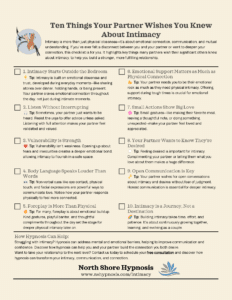
Hypnosis: An Effective Approach to Alleviating Sexual Pain Disorders
Introduction
Sexual pain disorders, also known as dyspareunia and vaginismus, can significantly impact an individual’s quality of life, affecting intimacy, self-esteem, and overall well-being. While various treatment options exist, including medication, physical therapy, and counseling, hypnosis has emerged as a promising approach. This blog post will discuss the role of hypnosis in treating sexual pain disorders, citing relevant research and expert opinions.
Understanding Sexual Pain Disorders
Sexual pain disorders can manifest as persistent or recurrent pain during sexual intercourse, negatively affecting sexual satisfaction and interpersonal relationships. Dyspareunia refers to pain experienced during penetration or deep thrusting, while vaginismus involves involuntary muscle contractions around the vagina, making penetration difficult or impossible (American Psychiatric Association, 2013). These conditions can stem from various factors, including psychological, such as anxiety or past trauma, and physical causes, like infections, hormonal imbalances, or structural abnormalities (Binik, 2005).
The Power of Hypnosis
Hypnosis is a therapeutic technique that guides a person into a deep state of relaxation and focused attention, where they become more open to suggestions (Hammond, 2010). This altered state of consciousness can facilitate changes in thoughts, feelings, and behaviors, making it an effective tool for addressing various issues, including anxiety, pain management, and smoking cessation (Hammond, 2010).
Hypnosis and Sexual Pain Disorders
Research indicates that hypnosis can be an effective intervention for sexual pain disorders. A study conducted by Melzack et al. (1997) found that hypnosis significantly reduced pain during intercourse in women with dyspareunia. Another study by Alladin (2016) found that a combination of hypnosis and cognitive-behavioral therapy (CBT) effectively treated vaginismus, leading to improved sexual functioning and satisfaction.
The success of hypnosis in treating sexual pain disorders lies in its ability to address the psychological and physical factors contributing to the conditions. By fostering relaxation, promoting a positive mindset, and teaching effective coping strategies, hypnosis can help individuals manage their pain and experience greater sexual satisfaction (Hammond, 2010).
How Hypnosis Works for Sexual Pain Disorders:
Reducing Anxiety and Stress
Anxiety and stress can exacerbate sexual pain disorders (Binik, 2005). Hypnosis helps individuals enter a deep state of relaxation, reducing anxiety and stress levels (Hammond, 2010). By learning to relax and manage anxiety, individuals can better enjoy sexual encounters and experience decreased pain.
Managing Pain and Discomfort
Hypnosis effectively reduces pain perception (Melzack et al., 1997). Through pain management techniques, such as relaxation, guided imagery, and dissociation, hypnosis can help individuals manage their pain and discomfort during sexual encounters, leading to improved sexual experiences.
Enhancing Body Awareness and Control
Hypnosis can help individuals develop greater body awareness and control, allowing them to relax their muscles and manage involuntary contractions often associated with vaginismus (Alladin, 2016). By learning to control their bodily responses, individuals can experience more comfortable and enjoyable sexual encounters.
Developing Better Coping Strategies
Hypnosis can teach individuals effective coping strategies to manage their emotions and physical symptoms of sexual pain disorders (Hammond, 2010). By learning to focus on the present moment, individuals can develop mindfulness skills that can help them better navigate the challenges of their condition and enhance their sexual experiences.
Visualization Techniques
Visualization is a powerful tool used in hypnosis to facilitate change (Hammond, 2010). Individuals experiencing sexual pain disorders can use visualization techniques to mentally rehearse successful and pleasurable sexual encounters. This mental rehearsal can help build confidence and improve sexual experiences in real-life situations.
Conclusion
Hypnosis offers a promising, non-pharmacological approach to treating sexual pain disorders. By targeting the psychological and physical factors contributing to these conditions, hypnosis can help individuals manage their pain, reduce anxiety, and develop effective coping strategies to improve their sexual experiences. While further research is needed to fully understand hypnosis’s mechanisms and long-term effects on sexual pain disorders, current evidence suggests that it can be an effective and safe intervention for many individuals.
Citations:
Learn Ten Things Your Partner Wishes You Knew About Intimacy

Do you want to have better intimate relationships? Discover ten things your partner wants you to know to have more fulfilling relationships.
Click now for your free checklist, “Ten Things Your Partner Wishes You Knew About Intimacy.

